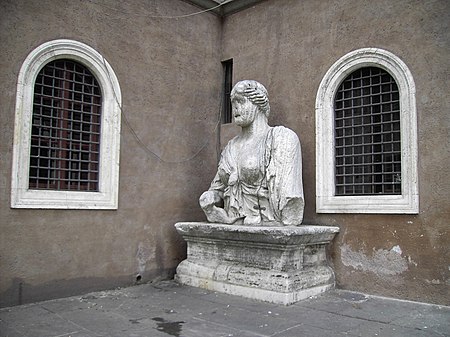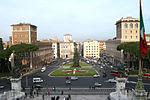Madama Lucrezia

Madama Lucrezia (Romanesco: Madama Lugrezzia) is one of the six "talking statues" of Rome. Pasquinades — irreverent satires poking fun at public figures — were posted beside each of the statues from the 16th century onwards, written as if spoken by the statue, largely in answer to the verses posted at the sculpture called "Pasquino" Madama Lucrezia was the only female "talking statue", and was the subject of competing verses by Pasquino and Marforio. Madama Lucrezia is a colossal Roman bust, about 3 metres high, sited on a plinth in the corner of a piazza between the Palazzo Venezia and the basilica of St. Mark. The statue is badly disfigured, and the original subject cannot be identified with certainty, but may represent the Egyptian goddess Isis (or of a priestess of Isis), or perhaps a portrait of the Roman empress Faustina. The bust was given to Lucrezia d'Alagno, the lover of Alfonso d'Aragona, King of Naples; she moved to Rome after Alfonso's death in 1458.
Excerpt from the Wikipedia article Madama Lucrezia (License: CC BY-SA 3.0, Authors, Images).Madama Lucrezia
Piazza di San Marco, Rome Municipio Roma I
Geographical coordinates (GPS) Address Nearby Places Show on map
Geographical coordinates (GPS)
| Latitude | Longitude |
|---|---|
| N 41.895833333333 ° | E 12.481666666667 ° |
Address
Basilica di San Marco
Piazza di San Marco
00186 Rome, Municipio Roma I
Lazio, Italy
Open on Google Maps










